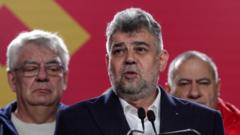Amid rising tensions and a shift in support, Romania prepares for political instability as Ciolacu steps down, creating a power vacuum while the country navigates significant challenges ahead.
Romanian Political Landscape Shakes as PM Resigns in Wake of Nationalist Election Victory

Romanian Political Landscape Shakes as PM Resigns in Wake of Nationalist Election Victory
Political turmoil erupts in Romania after Prime Minister Marcel Ciolacu resigns following a national election result favoring right-wing candidate George Simion.
Romania plunged into political mayhem on Monday as Prime Minister Marcel Ciolacu submitted his resignation, resulting in the departure of his Social Democrat party from the government coalition. This dramatic turn of events followed a right-wing nationalist victory by George Simion in the recent first round of the presidential election, where the eurosceptic candidate garnered 40.9% of the vote.
Simion, who is expected to triumph in the anticipated run-off on May 18 against liberal candidate Nicușor Dan, has pledged to prioritize Romanian interests. The outcome, which has already caused significant concern among EU and NATO members, reflects growing public discontent with the political establishment, particularly following the annulment of last year’s presidential election.
In a coalition meeting, Ciolacu expressed that the alliance had lost its legitimacy and failed to achieve critical objectives. He pointed out that the current coalition lacked a unified front—one of their primary goals was to present a joint presidential candidate. Notably, the far-right nationalist party and others collectively captured nearly a third of the votes, signaling a shift in Romanians' political affiliations.
Romania's interim president, Ilie Bolojan, previously took the reins in February amidst controversies surrounding the annulled presidential elections. His next move will be critical as Ciolacu’s resignation opens a void that could set the stage for a turbulent transition.
Elena Calistru from the monitoring group Funky Citizens warned that the country may experience up to 45 days of political instability, raising alarms about the necessity for steady governance during this chaotic phase. Ciolacu acknowledged that the new president would replace him, further affirming the anticipated formation of a new coalition.
Criticism toward the current leadership also surfaced from within the Social Democrat ranks, with local leaders branding the party's strategy as embarrassing and indicating a need for significant reevaluation.
At just 38 years old, Simion has successfully positioned himself as a strong contender in Romanian politics, casting himself as an embodiment of populist wishes while attracting notable support from the Romanian diaspora and engaging voters with calls for a return to national pride and identity which he believes have been overlooked.
In a compelling critique of contemporary politics, political analyst Radu Albu-Comanescu described Sunday’s election results as an extreme expression of public discontent with the prevailing political order. As Romania stands at a crossroads, this electoral discontent may signal a significant shift in the nation’s democratic fabric and its approach toward Europe.
Simion, who is expected to triumph in the anticipated run-off on May 18 against liberal candidate Nicușor Dan, has pledged to prioritize Romanian interests. The outcome, which has already caused significant concern among EU and NATO members, reflects growing public discontent with the political establishment, particularly following the annulment of last year’s presidential election.
In a coalition meeting, Ciolacu expressed that the alliance had lost its legitimacy and failed to achieve critical objectives. He pointed out that the current coalition lacked a unified front—one of their primary goals was to present a joint presidential candidate. Notably, the far-right nationalist party and others collectively captured nearly a third of the votes, signaling a shift in Romanians' political affiliations.
Romania's interim president, Ilie Bolojan, previously took the reins in February amidst controversies surrounding the annulled presidential elections. His next move will be critical as Ciolacu’s resignation opens a void that could set the stage for a turbulent transition.
Elena Calistru from the monitoring group Funky Citizens warned that the country may experience up to 45 days of political instability, raising alarms about the necessity for steady governance during this chaotic phase. Ciolacu acknowledged that the new president would replace him, further affirming the anticipated formation of a new coalition.
Criticism toward the current leadership also surfaced from within the Social Democrat ranks, with local leaders branding the party's strategy as embarrassing and indicating a need for significant reevaluation.
At just 38 years old, Simion has successfully positioned himself as a strong contender in Romanian politics, casting himself as an embodiment of populist wishes while attracting notable support from the Romanian diaspora and engaging voters with calls for a return to national pride and identity which he believes have been overlooked.
In a compelling critique of contemporary politics, political analyst Radu Albu-Comanescu described Sunday’s election results as an extreme expression of public discontent with the prevailing political order. As Romania stands at a crossroads, this electoral discontent may signal a significant shift in the nation’s democratic fabric and its approach toward Europe.



















